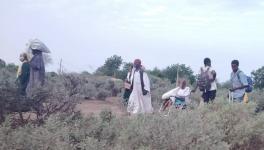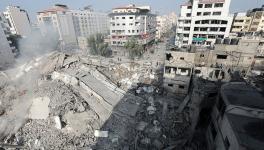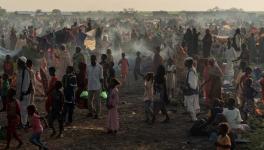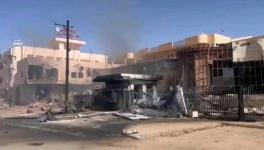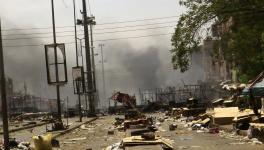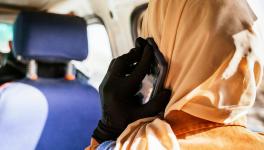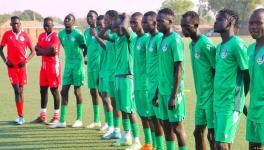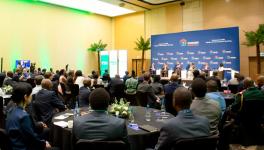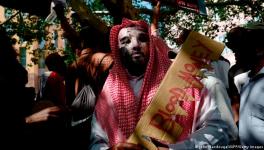2 Killed and 172 Injured in 18th Country-Wide Protests Against Military Coup in Sudan
(Photo: Herculesami/Twitter)
Two more pro-democracy protesters were killed by the security forces in Sudan on Monday, February 14. The north African country witnessed mass country-wide protests for the 18th time since the military coup on October 25, 2021.
The death toll of protesters resisting the coup has now risen to 81, said the Central Committee of Sudanese Doctors (CCSD). It documented 172 injuries on Monday including 20 gunshot and 14 rubber bullet injuries.
31 others suffered head injuries as the security forces continue the illegal practice of firing tear gas canisters directly at the bodies of the protesters. At least 10 suffered suffocation due to the gas.
Blunt trauma caused by direct impact of the canisters and suffocation from gas inhalation has been the main cause (1,024) of the over 2,400 injuries since the coup, according to an analysis published earlier this month by the Omega Research Foundation.
Five other protesters were run over by vehicles of the security forces. One of them, who sustained a head injury, has suffered brain hemorrhage, the CCSD added.
Most of the injuries were recorded in Khartoum State. In the country’s capital city Khartoum, rallies starting out from multiple neighborhoods were met with violence as they converged toward the Presidential Palace, the seat of army chief and coup leader Abdel Fattah al-Burhan. Protesters from neighboring Khartoum North crossed over to Omdruman and joined the protesters there to march to the parliament.
“Processions marched peacefully towards the parliament building in Omdurman, writing an epic of steadfastness in front of the seat of the people’s authority, despite heavy repression by security and military coup agencies.. [A]s a result of live bullet firing [here], the revolutionary Munther Abdel Rahim martyred, and many others were injured,” said a statement by the East Khartoum Neighborhoods Resistance Committees (RCs) Coordination.
A network of well over 5,200 RCs, organized in neighborhoods across the country, are leading the struggle against the military junta to achieve democratic civilian rule.
Mass demonstrations, rallies and barricades were reported in at least 17 cities across several States including in White Nile, Blue Nile, Jazirah, Al Qadarif, Kassala, Sennar, North Kordofan, South Darfur, River Nile and Red Sea.
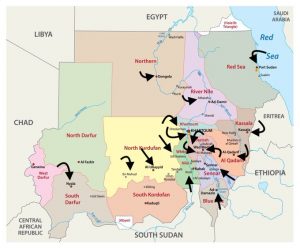
Protesters escalate actions to disrupt trade with Egypt
In Sudan’s Northern State, protesters escalated the blockading of trucks carrying goods for trade with its northern neighbor Egypt, whose government is known to be supporting Sudan’s military junta.
The barricade in Al Hafeer was reconstructed on Monday. It was dismantled by security forces a day earlier, who let around 40 trucks of camels pass through towards Egypt after detaining the 19 protesters manning it, Mukhtar Bairam, member of an RC in the state’s capital city Dongola, told Peoples Dispatch.
Other protesters, he added, surrounded the police station and ensured their release by night before reconstructing the barricades again on Monday morning. The barricade in Abri, east of Al Hafeer across river Nile, is holding strong.
Residents from surrounding localities marched to the barricade in Sortoud on Monday to pay respects to Atef Ali, a 38-year-old RC member who was killed there on February 11 after being run over by an Egyptian truck that forced its way through the barricades.
“People in northern Sudan are hungry. We have been watching our cattle, food crops all being exported to Egypt, even as we starve,” Bairam said while explaining the reasons for disrupting trade between the two countries.
The bulk of the exports are allegedly undertaken by businesses owned by the military, whose dominance across the economy has been pushing farmers and small producers out of the market.
This situation, combined with anger against Egypt’s perceived support to the coup generals whose continuation in power is seen as a direct threat to food security, is driving the blockade action.
“So we will keep building barricades all over these roads until we achieve a full civilian government,” Bairam said. The map below shows the locations of 15 barricades that have been erected along the highway connecting to the border-crossing between the two countries.
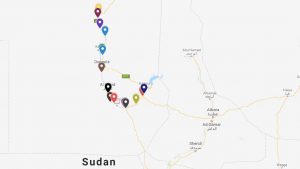
Military junta in service of the ousted Islamist regime
In the meantime, the military junta, which is hurriedly reinstating members of former dictator Omar al-Bashir’s Islamist National Congress Party (NCP) into state structures, has turned against members of the Empowerment Removal Committee (ERC).
The ERC was established under the joint civilian-military government formed after Bashir’s ouster in 2019 following the December Revolution that started in 2018. It was tasked with purging NCP members from state structures and confiscating their illegally acquired properties.
After reinstating many hundreds of members suspended by the ERC and returning confiscated properties back to NCP leaders, the junta has begun a campaign to arrest members of the ERC.
The deputy head of this committee, Mohammed Al-Faki Suliman of the Unionist Alliance party, was arrested along with another member, Maj Awad Karendis, on the evening of Sunday, February 13. These arrests came after three other ERC members, including its secretary general Tayeb Othman Yousef, were arrested on February 9.
‘The Resistance Committees can ‘out-administer’ the state’
“Sudanese people confront a military with the elite generals holding the state captive. They command the technical means of violence and soldiers. On top of this they have built a commercial empire through coercion and plundering from which they derive a stream of wealth shared through clientelism and cronyism,” Saleh Mamon wrote in the Labour Hub.
In their diplomatic efforts to “blunt the impetus of the democratic revolution,” he said, “they have the support of the US, UK and their allies, Saudi Arabia, UAE and Egypt who are no friends of democracy. The US envoys have visited the generals and also talked to the civilian groups.”
International support is effectively also extended by the United Nations Integrated Transition Assistance Mission Sudan (UNITAMS), whose calls for negotiations have been the “hope of the generals.. to divide the civilian movement.” However, the civilian movement continues to gain momentum under the leadership of the RCs.
“The Resistance Committees,” Mamon added, “are a new form of social power which enjoy greater social legitimacy than the military state apparatus. They have the potential to be self-governing and coordinating organs which can ‘out-administer’ the state by meeting the needs of their neighborhoods under the impact of the economic crisis. They have shown the courage to turn away from old formulas and invent a new future.”
Get the latest reports & analysis with people's perspective on Protests, movements & deep analytical videos, discussions of the current affairs in your Telegram app. Subscribe to NewsClick's Telegram channel & get Real-Time updates on stories, as they get published on our website.









